I am trying to get USB flash drive ID using this code:
ManagementObjectSearcher theSearcher = new ManagementObjectSearcher("SELECT * FROM Win32_DiskDrive WHERE InterfaceType='USB'");
foreach (ManagementObject currentObject in theSearcher.Get())
{
Console.WriteLine("PNPDeviceID: " + currentObject["PNPDeviceID"]);
}
On most of computers I will get something like this: USBSTOR\DISK&VEN_TQ&PROD_S1&REV_1.10\11100049977&0
but on some systems for the same USB drive I get something like this: USBSTOR\DISK&VEN_TQ&PROD_S1&REV_1.10\ 6&2D2B8A01&0& 11100049977&0
Note that the part 6&2D2B8A01&0& changes depending on port that USB drive is inserted in.
How can I get the first version of the ID on every system, regardless of port USB drive is inserted in?
UPDATE 1: when using Win32_DiskDrive USB drive is detected on every PC. But when using Win32_USBHub USB drive is not detected on problematic PCs.
UPDATE 2: when using SystemUSBDrives class from this answer, on problematic PCs I get this output:
Port 1:
SystemUSBDrives PNPDeviceID: USBSTOR\DISK&VEN_TQ&PROD_S1&REV_1.10\6&2D2B8A01&0&11100049977&0
SystemUSBDrives DeviceID: \\.\PHYSICALDRIVE2
SystemUSBDrives SerialNumber:
SystemUSBDrives VolumeSerialNumber: D6533504
Port 2:
SystemUSBDrives PNPDeviceID: USBSTOR\DISK&VEN_TQ&PROD_S1&REV_1.10\6&7A722D3&0&11100049977&0
SystemUSBDrives DeviceID: \\.\PHYSICALDRIVE2
SystemUSBDrives SerialNumber:
SystemUSBDrives VolumeSerialNumber: D6533504
Port 3:
SystemUSBDrives PNPDeviceID: USBSTOR\DISK&VEN_TQ&PROD_S1&REV_1.10\6&32CECE73&0&11100049977&0
SystemUSBDrives DeviceID: \\.\PHYSICALDRIVE2
SystemUSBDrives SerialNumber:
SystemUSBDrives VolumeSerialNumber: D6533504
Using this on other computers returns correct SystemUSBDrives SerialNumber value.
